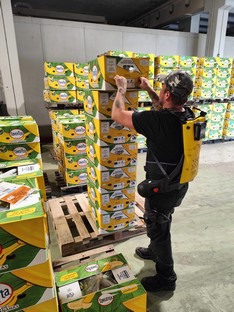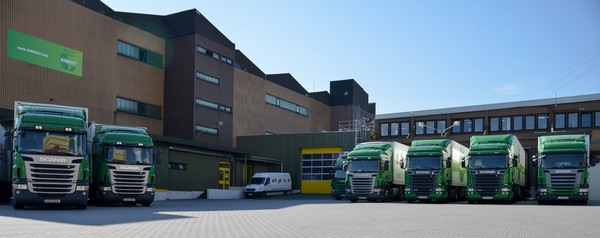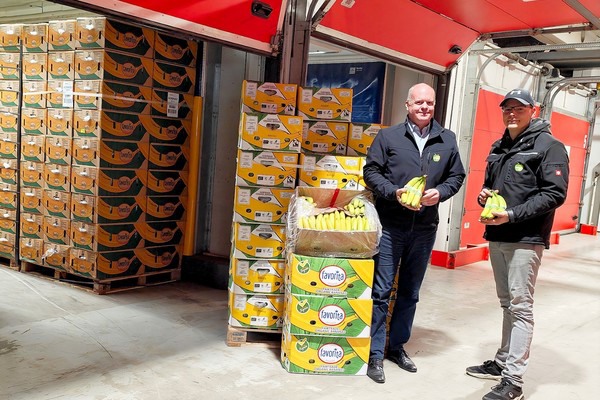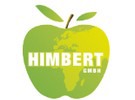Due to a comprehensive structural change, as well as the gradual concentration of trade, the banana market in Germany has changed fundamentally in recent years. Despite pandemics and inflation, per capita consumption of the crooked fruit in Germany has remained high in recent years (around 1.09 million tons were eaten in the 2021/2022 season, according to Statista). We spoke with the two-headed management of the Himbert company, which operates the largest banana ripening plant in Saarland, about the status quo as well as the future of the banana category.
E xactly 60 years ago this year, Himbert GmbH came into being in its present form. Two years before that, the family already started with the first activities around the ripening of bananas. With the move to Völklingen in 1979, the company switched to the press ripening process. Today, the company has 16 ripening chambers in which the goods can not only be ripened but also temporarily stored in a refrigerated environment. Up to 40,000 packages per week can be processed at the state-of-the-art site.
xactly 60 years ago this year, Himbert GmbH came into being in its present form. Two years before that, the family already started with the first activities around the ripening of bananas. With the move to Völklingen in 1979, the company switched to the press ripening process. Today, the company has 16 ripening chambers in which the goods can not only be ripened but also temporarily stored in a refrigerated environment. Up to 40,000 packages per week can be processed at the state-of-the-art site.
Right:
When it comes to ripening technology, Himbert GmbH relies on the multipurpose system from De Laat. Traditionally, demand is somewhat higher around the cold season.
Ripening, packaging and logistics
According to Himbert, the banana business has changed fundamentally in recent years. "The decisive factor was the change from trader to service provider. As a result of the change, which began about four years ago, we no longer buy the bananas ourselves, but the customer now obtains the goods directly from the producer or via an agency. As a result, we now act purely as a service partner in terms of ripening, packaging and logistics. This also means that we no longer have as much influence as before, i.e. that it is more difficult to react proactively to developments in the origin," describes Johannes Himbert, who has been running the company in the fourth generation since last year.
As a result of the turnaround, he says, sales in the banana sector have declined. This has prompted the traditional company to invest in other areas in order to remain competitive in the future, confirms Christof Seidel, another managing director at the company: "Two years ago, we updated our ripening capacities, which is why we can now also ripen mangoes and avocados if the banana business is not profitable. We see a lot of potential in this area in the near future as well."
 Himbert GmbH was also represented at the Saarbrücken wholesale market for many years.
Himbert GmbH was also represented at the Saarbrücken wholesale market for many years.
Expansion and cooperation
Thanks to its location west of Saarland's capital Saarbrücken, the French market is virtually on the company's doorstep. Seidel: "We have recently also had a customer in the Grand-Est region and want to further expand this sales market. Our delivery radius extends to Cologne, Frankfurt, Stuttgart and Basel. In addition, we are already working with regional partners. We are also open to further cooperations in the future."
Investments bear fruit
Although no longer directly involved in the banana trade, the management of Himbert GmbH continues to be aware of developments in the segment. In the past few years, the price of packages has risen gradually, they observe. They are trying to take this additional price into account in their services, especially since energy costs have also risen considerably in the past year. "Part of our electricity needs are covered by our PV system. But what also helps us is that we can ripen with pinpoint accuracy thanks to the investments in contemporary ripening technology, which is why we can save quite a bit of electricity over the entire ripening process."
 The two managing directors Christof Seidel and Johannes Himbert.
The two managing directors Christof Seidel and Johannes Himbert.
Today, conventional bananas account for around 70 percent of the total volume of goods handled, with organic and fair trade bananas also being processed. This distribution of the banana assortment has been stable for many years. Himbert: "The only development that took place was the switch from junior to Fairtrade bananas, which was carried out a few months ago. Due to the almost identical fruit size of the various bananas, differences in the ripening process are also no longer related to the segment, but only to the respective country of origin. In Ecuador, for example, there was a lot of rain this year, which had a corresponding impact on the quality of the produce."
Furthermore, Aldi Süd decided a few years ago to no longer market the goods in flowpacks, but in bulk with stickers. "Accordingly, apart from quality inspection, we also no longer have any contact with the goods, meaning the bananas are cooled, stored and distributed in the original carton," Himbert concludes.
Source: Himbert GmbH
Weitere Informationen:
Johannes Himbert & Christof Seidel
Himbert GmbH
Saarbrücker Straße 162
66333 Völklingen
Tel.: +49 6898 9333 0
Fax: +49 6898 9333 90
E-Mail : [email protected]
www.himbert.info
